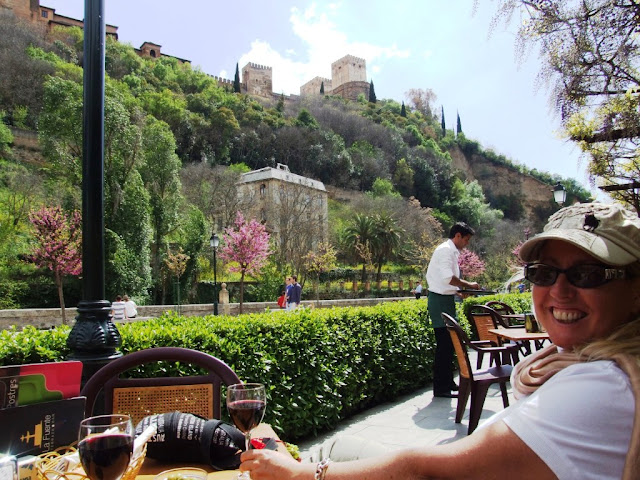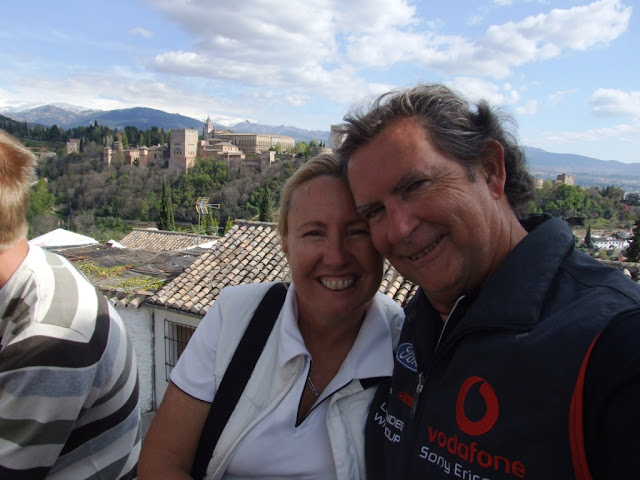April
2012
When
we decided to embark on a road trip through southern Spain we weren’t exactly
sure where we should go and what we should be trying to see. Sitting in our hotel room in Cartagena with a
map of Spain presented way too many possibilities. Looking for inspiration, Rob
threw a general request up on facebook asking for suggestions from any of our
friends who’d travelled the area. We were surprised by how many immediate responses
the post generated. Almost without fail everyone included the city of Grenada as
a ‘must see’ .
So
after a fantastic few days in Seville, we loaded up the mighty micro
rent-a-wreck with our worldly possessions of a duffle bag and back pack each,
fired up the navigation program on the Ipad and plotted a course to find out just
what had led so many friends to rate Grenada so highly.
After
extricating ourselves from the impossibly narrow streets that form the maze of
Seville’s old city we were soon heading towards the east through the countryside.
Spain’s highway system is actually pretty good and with the speed limit a very
civilised 120kph. We were also very impressed by the roadside signs warning motorcyclists
to be careful of idiot car drivers going slow on the motorway. We wish the
Australian authorities were as enlightened. Rob subscribes to the theory that
you’ll always get away with 10K over so our poor little buzz box’s engine was
gasping for breath trying to maintain 130kph up some of the climbs. He further
justified lead footing by saying he didn’t want any of those speeding bikes
imbedded in our duffle bags in the boot.
 |
| Only on Spanish Motorways |
The
upshot was that we made pretty good time and reached Grenada in time to do some
exploring that afternoon. After turning
left out the hotel door we soon found ourselves surrounded by fairly ugly
apartment blocks, in suburbia and wondering what the hell we were doing in this
hole. Surely this can’t be the Grenada everyone raved about. There must be
better just around the corner. An hour later, hopelessly lost, we spied through
a gap in the concrete jungle an amazing medieval fortress stretching far along
a ridge top in the distance. Bugger! We should of turned right leaving the
hotel. Note to self – look at a map before wandering off in a strange city.
Half
an hour later, newly acquired map in hand, we were winding our way through fantastic
narrow laneways lined with stores offering all sorts of bargains as we climbed ever
upwards.
 |
| You could spend days wandering the shops in Grenada |
For some reason Grenada seems to be a hot bed for bucks and hens parties. We passed over ten different groups celebrating upcoming nuptials in different wacky outfits and generally high levels of inebriation.
 |
| I'm sure this groom to be will be very proud of this buck's night outfit in years to come |
Finally
we reached the Mirador de San Nicolás,
a square on top of a high hill, and were rewarded with a great view across a
narrow valley to one of Spain’s most incredible man made features, the
Alhambra. Literally hundreds of people were sitting all around the square
simply taking in the sight of this huge piece of history and the snow covered
Siera Nevada mountains that formed its backdrop. OK Grenada, we were now impressed.
 |
| The Alhambra - Grenada viewed from Mirador de San Nicolás |
Back
in our hotel we belatedly launched into some online research about the place to
plan our visit the next day.
 |
| Sustenance is definately a must when doing research on the internet |
The
Alhambra's Moorish palaces were built for the last Muslim Emirs in Spain and
its court. Completed towards the end of Muslim rule of Spain by Yusuf I
(1333–1353) and Muhammed V, Sultan of Granada (1353–1391), the Alhambra is a
reflection of the culture of the last centuries of the Moorish rule, by then
reduced to just the Nasrid Emirate of Granada. It is a place where artists and
intellectuals had taken refuge as the Spanish Christians won victories over Al
Andalus.
The
Alhambra integrates natural site qualities and is a testament to Moorish
culture in Spain and the skills of Muslim, Jewish, and Christian artisans,
craftsmen, and builders of their era. The literal translation of Alhambra,
" the red (female)," reflects the colour of the red clay of the
surroundings of which the fort is made. After the reconquest by the Catholic
Monarchs in 1492, some portions were used by the Christian rulers. The Palace
of Charles V, built by Charles V, Holy Roman Emperor in 1527, was inserted in
the Alhambra within the Nasrid fortifications.
After being allowed to fall into disrepair for
centuries, the Alhambra was "discovered" in the 19th century by
European scholars and travellers, with restorations commencing. It is now one
of Spain's major tourist attractions, exhibiting the country's most significant
and well known Islamic architecture, together with 16th-century and later
Christian building and garden interventions. The Alhambra is a UNESCO World
Heritage Site, and the inspiration one of the most popular tourist attractions
in all of Spain.
The
bad news was that although admission to the general areas of the Alhambra was
inexpensive, tickets to go through the palaces and military section were
limited and normally booked out days in advance. You can line up early in the
morning in the hope of scoring one of the very limited number they make
available on the day but we were able to obtain some from one of the local companies
that offer guided tours.
Our
plan was to spend the morning there and then have a look at some more of the old part
of the town in the afternoon. It didn’t work out that way. We can honestly say
that the Alhambra was the most remarkable place we have visited on this trip.
We spent all day exploring the palaces and different areas and still did not see it all. It was
very late in the afternoon before we made our way down the hill and even then
we found a café with a good view of the fortifications and enjoyed a bottle of
wine still staring up at its walls.
Here is just a small sample of the hundreds of photographs Rob took. There were thousands of people in the place and he spent ages trying to get shots without them in as much as possible. If you’ve got some time on your hands google Alhambra Grenada and see more about this amazing place. Thankyou everyone that recommended we go there. We are in your debt.
 |
| Views from the Palacio Generalife |
 |
| Windows of the Harem where the wives would look down on happenings in the palace |
 |
 |
| All the water features are still fed by the original 700 year old aquaduct system |
 |
| The main defensive fortifications are built on the edge of the cliff. |
 |
| Atop the tower |
 |
| The views down over Grenada are very impressive |
 |
| Grenada too has a big cathedral but it's so hemmed in by tall buildings you can hardly see it from the ground |
 |
| Part of the original hamman (bath house) |
 |
| Holes in the hamman ceiling let in rays of star shaped sunshine to light the room |
 |
| Definately wine o'clock after all the walking we did in the Alhambra |
Next
morning we were once more on the road east. This time heading to spend a relaxing
week or so in a friends unit near Alicante. We met Sally on the Sail Indonesia
Rally and spent some time travelling with her in Thailand before we all crewed
on Curious in the Kings Cup Regatta in Phuket. Even though Sal was still
tripping around Asia when she heard we were in Spain she very generously
offered us the use of her apartment for a while. It was exactly what we needed.
Somewhere to just stop moving for a bit while we worked on a new plan for the
rest of the summer now that our crew spots on the yacht Astor had fallen through.
 |
| Sally's mum, Joan, made us very welcome |
We were
able to spend some time with Sally’s mum, Joan who lives across the street,
enjoy the coastline and get down to some serious work on www.findacrew.net to find ourselves another
boat to sail on. Thanks Sally. It was pure gold.
 |
| It was great to kick back at Sally's place for a while |
 |
| The Brits have arrived in Spain bigtime. Taken from Sally's roof terrace. |
If you have only recently discovered our blog and would like to read how it all started, or work through our previous adventures, click the link to go back to our first blog entry. Stuff it. Let's just go sailing anyway. We hope you enjoy reading the previous posts to catch up on our story.

















